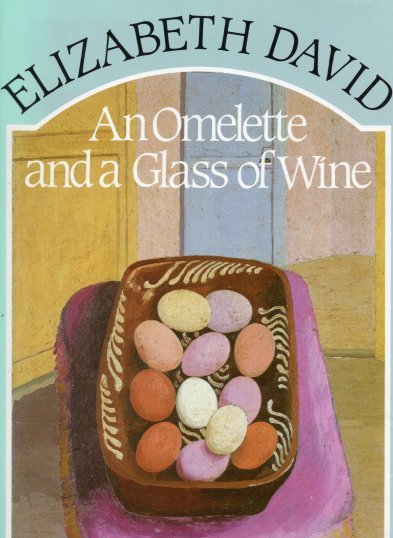An Introduction to Elizabeth David
and a Review of An Omelette and a Glass of Wine
 Elizabeth David was the most celebrated British food writer of the twentieth century. The Editor’s introduction to her writing came with the American publication of An Omelette and a Glass of Wine in 1985; it was a gift from britishfoodinamerica’s own S. E. Dearmont. For someone then unfamiliar with David’s mystique, the book felt uneven, odd--and interesting. It can be exasperating, yet remains the Editor’s favorite of David’s books and, along with English Bread and Yeast Cookery, the best.
Elizabeth David was the most celebrated British food writer of the twentieth century. The Editor’s introduction to her writing came with the American publication of An Omelette and a Glass of Wine in 1985; it was a gift from britishfoodinamerica’s own S. E. Dearmont. For someone then unfamiliar with David’s mystique, the book felt uneven, odd--and interesting. It can be exasperating, yet remains the Editor’s favorite of David’s books and, along with English Bread and Yeast Cookery, the best.
An Omelette is a compilation of journalistic articles, in this case written over a twenty-eight year period from 1952 through 1980. David felt uneasy about her declining production and possibly about the book’s publication, fretting “that the material in her latest book was not original.” (Chaney 446) That is ironic, for despite the impression that David often hoped to create, virtually all of her books were stitched together from disparate sources, many of them previously published in different form.
An Omelette and a Glass of Wine does not pretend to coherence; that is to the good, for as her friend Veronica Nicholson observed, David
“couldn’t handle a really long piece. In a way her books are bits and pieces. I told her that I had come to that conclusion. I don’t know if she was pleased. I said I thought she played a beautiful minuet but not a concerto… that she was something like Lamb and Hazlitt and all those lovely writers whom she despised. She wasn’t a story-teller.” (Chaney 356-57)
Unintended irony seems to have been the overriding constant of David’s life, as we have demonstrated in the critical. She not only wrote like writers she despised; David kept the name of a husband she disdained and divorced, and worried about its misappropriation. She was a food writer without much of a palate, who obsessed over authenticity but loved Uncle Ben’s rice (we do too) and instant coffee (here we draw a bright line). David demanded loyalty and gave none. She affected an almost cartoonish hauteur while loathing the English gentry from whom she emerged, and cultivated a prim persona while engaged in raffish affairs with married men and also with women until the age of 49, when she lost interest in sex altogether.
David also was a food writer who came to cooking late, was erratic in the kitchen (quail burnt, diners neglected), lost her sense of taste when she lost her libido and her interest in food after that. (Chaney 54-55, 66-67, 432; Cooper 231) By her fifties our chronicler of Mediterranean, English and exotic foods was not cooking much; by her sixties she had “all but given up eating in the evenings” and subsisted on “Roka cheese biscuits, omelettes, Parma ham and the occasional delivery of oysters or smoked salmon.” (Chaney 410; Cooper 231, 322) Her sympathetic biographer describes “an emotionally empty life.” (Cooper 231)
David loathed England but lived there, and wrote at length on subjects she despised, including a collection of essays (including recipes) about Christmas, a holiday she described as a “grisly orgy of spending and cooking and anxiety.” It was a time when she preferred to be alone. (Christmas 7). As noted in the critical, Spices, Salt and Aromatics in the English Kitchen, an ambitious if mistitled study of historical foodways (and another assembly of ‘bits and pieces’), leaves her reader to conclude that David did not much like English food.
If An Omelette and a Glass of Wine does not disclose these traits, it reflects them. Many of David’s judgments are intemperate or unfair, some are foolish, and in the introduction she attacks her editors as well as readers. Given all of this, why is the book appealing at all? It is appealing in no small measure because of David’s foibles and failings; her prose is (mostly) good; and she is by no means always wrong.
It took a certain courage (if not perversity) for David to warn her Francophile readers of the decline of French restaurant standards in “Eating out in provincial France, 1965-1977,” and her advocacy of fresh, seasonal food in “Fast and Fresh,” from way back in 1960, strikes a chord in this locavore era (although she would have abhorred the term). Nobody now would disagree with her attacks on mislabeling, or with David’s disdain for the crude efforts of food factories to influence her with unsolicited gifts promoting their dubious products, including synthetic lard and “two dishes called Upsidedown Top Hats and Queen Anne’s Muff.” (Omelette 28)
She took a withering view of most other food writers, which often was unfair, but when she did like an author or figure, her appraisal could be apt and might be moving. There is a brisk review of The Englishman’s Food by Drummond and Wilbraham (London 1958) that is unequivocally and appropriately positive. David’s famous essays on Norman Douglas read like learned notes on a lost love (too bad he was half a century older than she was), although David cannot resist marring them with acid attacks on the illustrator of his posthumous Venus in the Kitchen. Douglas did not need defending (at least not from pictures he did not pick) and the attacks feel out of place in an otherwise generous tribute.
She reveres two French writers, Marcel Boulestin (1878-1943) and Edouard de Pomiane (1875-1964). Her choice of Boulestin, who wrote a series of deservedly popular cookbooks during the interwar years and maintained an excellent restaurant in Covent Garden, is predictable, that of Pomiane less so. Boulestin is a wonderful figure, a Frenchman who “fled the malicious gossip, the dramas and scandals” of his Parisian circles to find fulfillment in London. (Omelette 162) He was something of a polymath who fought (for France) for five years in the first World War. Boulestin wrote novels, musical criticism, and news columns; translated Beerbohm; then worked as an art dealer (he turned a profit on Modigliani) and interior designer before turning to cookbooks and the kitchen.
To David’s evident surprise, Boulestin exhibited a “serious anglomania which extended even to our food, from mutton with mint sauce to “the anglo-oriental romance of curry.” (Omelette 162) He spent most of his life in Britain, but remained proudly French and never renounced his citizenship; he called his autobiography Myself, My Two Countries. In David’s hands his personality leaps from the page, and she makes a good case for the lasting impact of his work. Boulestin emphasized simplicity and innovation that soared from classic French--and English--precepts that his less precocious culinary rivals overworked. In a wonderful passage, David decides that “[h]is special gift was to get us on the move,” metaphorically and intellectually, as well as physically: “He was nothing if not open-minded, adapting English ingredients to his own purposes and forever excercising his gift for fantasy.” (Omelette 170, 171) Nothing could have been more appealing to David herself, and her enthusiasm for him sweeps us in. Don’t you wish you knew Boulestin?
Pomiane is a less predictable choice, if only for his obscurity in the English speaking world: “In France,’ as David notes, “his books were best-sellers; among French cookery writers his place is very much one apart.” (Omelette 175)
In some of her best work, David explains why:
“Adored by his public and his pupils, feared by the phoney[sic], derided by the reactionary, de Pomiane’s irreverent attitude to established tradition, his independence of mind backed up by scientific training, earned him the reputation of being something of a Candide, a provocative rebel disturbing the grave conclaves of French gastronomes, questioning the holy rites of the ‘white-vested officiating priests’ of classical French cookery.” (Omelette 176)
They could use Pomiane in France today.
He too is a compelling figure. Like Boulestin, Pomiane spent years in the trenches and straddled worlds, in his case as a physician, researcher (at the Institut Pasteur no less), broadcaster, cook and cookbook author. He coined the term “Gastrotechnology” to promote what David calls “the scientific explanation of accepted principles of cookery” as a means to improving nutrition. (Omelette 175) Today we might expect all manner of bacteria, bird seed and tofu from such a program; from Pomiane we got inventively simple French recipes rendered with common sense and clarity, “a real lesson in how to avoid the obvious without being freakish.” (Omelette 178)
David maintains that Pomiane prefigured the nouvelle cuisine of the 1970s without its fripperies and failings, but he was more innovative even than that. He did not straddle the Channel like Boulestin, but brought his Polish heritage to bear on a streamlined French technique: Pomiane “passes speedily from the absurdities of haute cuisine to the shortcomings of folk cookery” in a conversational style that should reassure the most insecure cook. (Omelette 179) He advises his readers throwing dinner parties to “prepare only one good dish” and offers scores of them, along with simple starters, inventive salads (he loved beets and used them in ways a French chef would not have fathomed; the influence of Poland), bright tarts and undisguised fruits. David on Pomiane (she also wrote the introduction to a 1967 English translation of Cooking With Pomiane) is David at her best; you want to rush out, buy his books and cook his food. You can: the Modern Library reissued the 1967 translation, with David’s introduction, in 2001. New copies remain in print.
David also tried to rescue two other French chefs from obscurity, and they are of historical significance because they embody a lost tradition; the cooking of English food in France. In "Franglais", she addresses books by Benjamin Renaudet, Les Secrets de la Bonne Table (written sometime between 1870 and 1914), and Alfred Suzanne, La Cuisine Anglaise (from 1898). Neither book has been translated into English and neither remains in print; Renaudet’s book, which David prefers, is impossible to find.
"Franglais" is not as strong as some of the essays in An Omelette and a Glass of Wine--David is unreasonably dismissive of Suzanne and uses her platform, inappropriately here, to bash British eating habits while professing horror at the notion that anyone might convert the French to British food--but it makes a subtle point and issues an implicit challenge. Someone, who must be Francophone (Gillian Lehmann comes to mind), should dig into the archives, examine the oral tradition, and determine what French buyers did with these books. Did they sell better in some regions than others? Did French writers cite them? Were there French Boulestins, however humble by comparison? We do not know, and believe with David “that it would be so interesting to see what French housewives would evolve from authentic English recipes. We should see our own cooking with fresh eyes.” (Omelette 155) The written record, however, points only the other way.
An Omelette and a Glass of Wine has some good recipes too, including the potted foods that David sought to revive during the 1960s and her “Syllabubs and Fruit Fools” from 1969. If you choose to read only one of her books, this should be it.
Sources.
Lisa Chaney, Elizabeth David (London 1998)
Artemis Cooper, Writing at the Kitchen Table: The Authorized Biography of Elizabeth David (London 1999)
Elizabeth David, An Omelette and a Glass of Wine (New York 1985)
Jill Norman (ed.), Elizabeth David’s Christmas (Boston 2008)
Edouard de Pomiane, Cooking With Pomiane (New York 2001)

